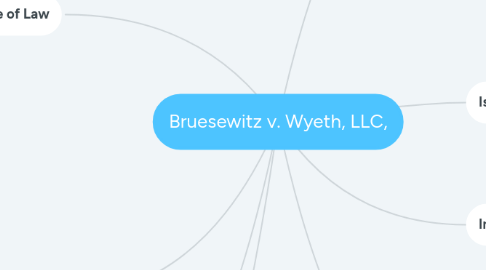Bruesewitz v. Wyeth, LLC,
por Gladys Johnson

1. Rule of Law
1.1. National Childhood Vaccine Injury Act
1.1.1. Passed by Congress in 1986 to reduce liability and respond to public health concerns after several vaccine manufacturers halted production after damages were awarded despite lack of scientific evidence to support vaccine injury claims. The liability and the prices of vaccinations increased significantly.
1.2. Per the CDC, The National Vaccine Program Office (NVPO) was established to coordinate immunization-related activities between all Department of Health and Human Services (DHHS) agencies including the Centers for Disease Control and Prevention (CDC), Food and Drug Administration (FDA), National Institutes of Health (NIH), and the Health Resources and Services Administration (HRSA)
1.2.1. Vaccine licensing is a lengthy process that may take 10 years or longer. The FDA requires that vaccines undergo three phases of clinical trials with human subjects before they can be licensed for use in the general public:
1.2.2. In the last decades, numerous changes in vaccine production and administration have reduced the number of side effects and resulted in safer vaccines.
2. Analysis/ Application
2.1. Bruesewitz wanted to sue the manufacturer for responsibility of the defected vaccines
2.2. The manufacturer maintained protection for responsibility of any defects.
2.3. The courts found and upheld that manufacturers were not liable for vaccine-induced injury or death if accompanied with the proper directions and warnings.
3. Conclusion
3.1. Bruesewitz argued that the NCVIA does not protect vaccine manufacturers against all design-defect claims. Wyeth argued that part of NCVIA was Congress' desire to shield vaccine manufacturers against costly design based litigation that threatened to drive manufacturers out of the vaccine market. The court held that the design defect claims were expressly preempted by the Vaccine Act. Therefore the manufacturers were not liable for vaccine-induced injury or death if accompanied with the proper directions and warnings.
4. Importance
4.1. A business professional would care as this is a public health safety issue. This may affect any individual and/or their loved ones. The regulations associated with the NCVIA determine the safety for population health matters.
5. Facts
5.1. Parties – Russel and Robalee Bruesewitz on behalf of Hannah Bruesewitz, United States Supreme Court, Wyeth Inc
5.2. What Happened – The Supreme court case that determined a section of the National Childhood Vaccine Injury Act of 1986 exempted all vaccine design defect claims against vaccine manufacturers. The poor design of this vaccine caused injury to Hannah Bruesewitz, daughter who was the victim. At six months old, Hannah experienced frequent seizures which eventually left her displaying autistic-like symptoms. Her condition will require her to have lifelong medical care.
5.3. Procedural History - The Bruesewitz sued due to their daughter having multiple seizures after using Wyeths vaccination. Hannah's parents filed suit in Pennsylvania State Court and then the US Court of appeals for the Third Circuits affirmed.
6. Issue
6.1. Whether The United States Supreme Court should provide immunity to all design-defect claims advanced against vaccine manufacturers or if the vaccine manufacturers should be subject to litigation for design so victims can be compensated for injuries that are presumed to have occurred from the design of the vaccine.
7. Impact
7.1. Several lawsuits were filed against vaccine manufacturers and healthcare providers by people who believed they had been injured by vaccinations.
8. Influence
8.1. The National Vaccine injury Compensation Program (NVICP) was created to compensate those injured by vaccines on a "no fault" basis.
8.2. NCVIA requires health care providers who administer vaccines to provide a vaccine information statement (VIS) to the person or the guardian of the person getting the vaccine.
8.3. Health care providers are required to report certain adverse events following vaccination to the Vaccine Adverse Event Reporting System (VAERS)


